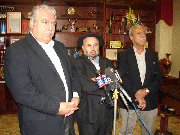
|
|
Local media flocked to the Lebanese American Heritage Club to hear reaction to President Obama’s speech from local Arab American community leaders Osama Siblani, L, Imad Hamad, Hasan Newash and others. PHOTO: Nick Meyer/TAAN |
Various local and national media outlets attended to hear remarks from Congress of Arab American Organization (CAAO) leaders on the matter on a day when Arabs and Muslims across the world debated the merits of the speech.
Each leader stressed that while they were encouraged by Obama’s speech reaching out to the Arab and Muslim worlds, actions speak louder than words.

|
|
Residents watch a televised broadcast of U.S. President Barack Obama’s speech, at the Culture Ministry in Baghdad June 4, 2009. REUTERS |
“But the president alone can’t do miracles. There are plenty of challenges and there’s still a long way to go.”
Obama’s stance on the freezing of settlement construction and support for a two-state solution for peace in the West Bank from Israelis was praised by Palestine Michigan Office head Hasan Newash, but he reminded the media of the still-critical situation in Palestine.
“The Palestinians are still subject to home demolitions, ethnic cleansing and racist laws,” Newash said. “I am encouraged but I need action. It’s not the president that’s going to make it happen, it’s the American people.”
Newash cited the amount of aid the U.S. still sends Israel, which is about $3 billion per year, and The Arab American News Publisher and CAAO member Osama Siblani suggested that the threat of reducing or suspending aid could be used as a means to give Obama’s anti-settlement initiative teeth in Palestine.
Siblani was also cautiously optimistic about the new tone Obama has brought to the White House.
“We’ve seen we have a president who understands the world and has seen what the world is feeling,” he said. “The Arab and Muslim worlds have always been ready to cooperate. There is animosity and resentment toward policies but they do not feel that America is the enemy.”
At the same time, Siblani cautioned that those policies still need to change before any progress can be made.
“The tone of this president is strikingly different from his predecessor, but so far there is no progress on the ground. Criticizing settlements is not a new thing, Bush did it before Obama and promised that he would have an independent Palestinian state by the end of his first term, then by the end of his second term, but all Palestinians saw was more death and destruction.”
Other voices from around the U.S. and the Middle East also weighed in on the speech.
Associate Professor of Political Science and International Affairs, Marc Lynch of The George Washington University in Washington, D.C., said the speech carried a touch of both familiar and new presidential tones.
“It was neither “just like Bush” nor a total departure from past American rhetoric,” he said.
Ehab Qishawi, a diplomat in the foreign ministry in Gaza, saw signs of hope but said he would maintain his wait-and-see approach.
“He touched our emotions, especially when he quoted from the Qur’an,” he said.
“His words were good, but up to now we haven’t seen any policies on the ground. That’s what we’re waiting for.
“We’ve had a lot of experience with the Americans and we know that there are always red lines, especially when it comes to the relationship with Israel.”
“It is also undeniable,” the president did say, “that the Palestinian people – Muslims and Christians – have suffered in pursuit of a homeland. For more than sixty years they have endured the pain of dislocation.”
Analyst and Middle East commentator Ali Abunimah pointed out that Obama’s wording was off: “Suffered in pursuit of a homeland? The pain of dislocation? They already had a homeland. They suffered from being ethnically cleansed and dispossessed of it and prevented from returning on the grounds that they are from the wrong ethno-national group. Why is that still so hard to say?”
Asad Abu Shark, a professor of linguistics at al-Azhar University, said he was wary of “sugar-coated language.”
“Any American gesture in the right direction is welcome,” he said. “If the Americans want an even-handed policy we welcome that, but actions speak louder than words. We don’t want to live in hope until we die in despair.”
In Dearborn, Siblani said that Israel’s reaction to the settlement demands and two-state solution will have a huge impact on whether or not real change will see the light of day.
“We have accepted a two-state solution, now it’s up to Israel. The initiative has been out for seven years and not one Israeli or U.S. government official has recognized it.”
Siblani’s hope now is that Obama turns words into actions.
“Words can easily be forgotten if they are not supported with efforts on the ground to implement them and turn them into reality,” he said.
“This is a positive step in the right direction because the president is uniquely positioned to repair the damaged links with the Muslim and Arab worlds.
“He understands the real issues behind the strained relations between the United States and the Muslim world and his speech was well received in this community.”
Siblani urged more cooperation to work towards a common goal.
“The Arab community is ready to do its part to help the president achieve the goals he set in his unprecedented speech. We ask that the American people and the Congress in particular lend him a hand in this very difficult but attainable mission.”
Will Youmans contributed to this report.






Leave a Reply